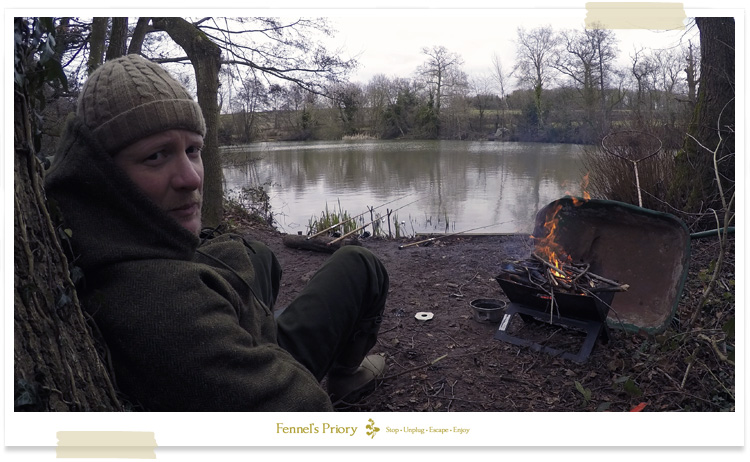
Eggs in the Fridge? It's Winter Camping.
I’m a big fan of camping, especially when it involves a spot of fishing. Sometimes I cook my catch over the campfire, but mostly I’ll safely return the fish to the water. Putting the fish back lends itself to a form of camping-fishing where one fishes for pleasure more so than food. Here in the UK, such fishing is often for carp, where camping activities occupy one’s mind during the long periods (often days) between bites.
Carp fishing is best done in summer, when one can enjoy the atmosphere of dawn mists and brooding dusks. It’s when warm water encourages the fish to be most active and warm air encourages anglers to sleep outside at night.
Classic summertime camping?
How wonderful to be beside a lake in high summer, camping with friends, and fishing for a species that encourages us to laze beneath canvas. Fishing is almost an excuse to ‘be there’, but for me it’s more about indulging my love of camping - especially outdoor cooking and building fires.
Can you imagine my excitement, therefore, when my friend Peter Whipp telephoned me asking if I’d be interested in a spot of camping-fishing at one of our favourite lakes? He’d booked the whole lake for a week, so we could choose our company and have a proper boy’s adventure.
“There’ll be barbecuing, beers, banter...and possibly some fishing action,” said Pete. “Are you in?”
Of course I was in. I was in as soon as I knew it would be an opportunity to pitch my tent with friends. “Sure thing,” I replied, “how could I miss an opportunity to sit together late into the evening, toasting marshmallows and watching bats flit across the surface of the lake. It will be classic carp fishing at its best.”
And then I remembered the obvious: “Just let me check my diary. When did you say we’d be going?”
“February,” replied Pete. “Bring your thermals.”
Survival camping?
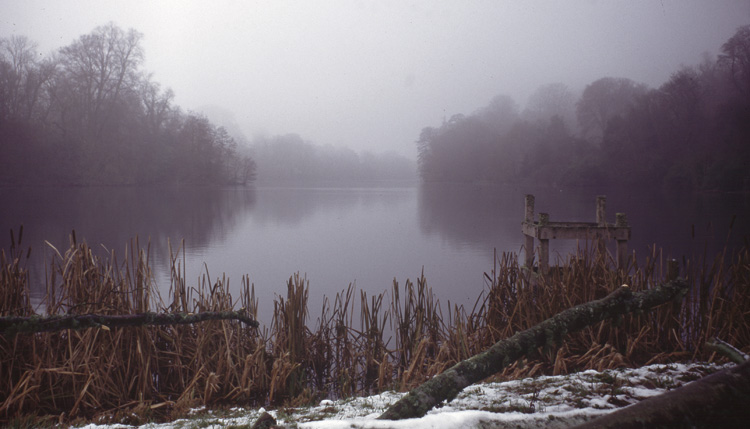
I’d not fished for carp in the depths of winter since 1998, when I’d nearly died from hypothermia. My friend Andy Wareham and I were committed to a winter campaign at Jade Lake, fishing every weekend regardless of the weather. I was a dyed-in-the-tweed traditionalist back then, so I was forbidden from using a tent or bivvy, so just rolled out my sleeping bag on the snow and propped my umbrella up over me.
I remember going to sleep, gazing up at a particularly beautiful starry night, then being woken the following morning by Andy brushing a crust of ice off my sleeping bag. My eyelids were so affected by the cold that they’d puffed up and were difficult to open. “Morning Froggy,” joked Andy as he commented on my frog eyes, “Isn’t it time you bought a bivvy?”
Of course, I couldn’t possibly compromise my traditional values, so I persevered with the minimalistic approach to camping. But after that winter at Jade, I never again yearned to fish for carp in winter. How then, could I learn from my mistakes so to fish with Pete in February?
I decided to use a tent. A minimalistic one. An ex-army canvas thing that was just big enough to crawl into with a hot water bottle, hip flask, and twenty layers of clothing.
“I’ll be fine,” I thought, as I pictured the French Army backpacking tent that had served me well – in summer.
Out in all weather
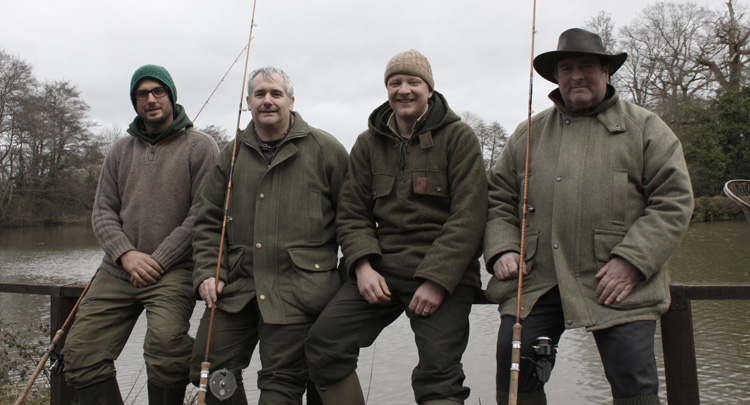
February came and Pete and I stood on the dam of the carp lake with our friends Andy Roberts and Graham Mabey. We’d not seen the lake since summer, so we were shocked at its ‘empty’ bones of leafless trees, weedless water, and absent signs of fish. But soon we perked up when discussing how and where to camp.
Pete and Andy chose swims on the windward side of the lake, both having proper carp bivvies in which to sleep. Graham, being by far the most successful angler amongst us, chose a known swim on the other bank - though he’d only got his open-fronted brolly-tent with him. I chose a swim halfway up the lake in the lee of some lakeside trees (hoping their sparse canopy would be enough to reduce the affects of any night-time frost). I was also hoping to keep out of sight with a ‘low profile’ ridiculously small tent.
The first night at the lake was lovely, with calm air and starry skies. We had a mild frost the following morning but nothing of concern. But the lake looked lifeless and muddy. Our focus was very much on cooking our meals and firing up the Kelly Kettles.
But then the weather changed.
The wind swung to the north-west and built to gusts of over 70 miles per hour. The lake water was whipped into the bank at Pete and Andy’s feet, and ice began to form on the windward side of the trees. I could almost feel the lake shudder at the sudden icy blast. There was no cloud or rainfall, just ‘blisteringly’ cold air.
All four of us cowered in our tents and prayed that none of the trees above our heads would lose a limb. Our lines remained cast into the lake, but – shivering in our sleeping bags – we hoped the fish wouldn't bite.
As the temperature plummeted and all life around the pool cowered and fell silent, night fell and reminded us that it would be fifteen hours before the sun would warm our bones. As I lay in my tent, lit only by a nightlight candle, I wondered whether the tiny flame would be enough to stop me from freezing.
Clutching a good idea
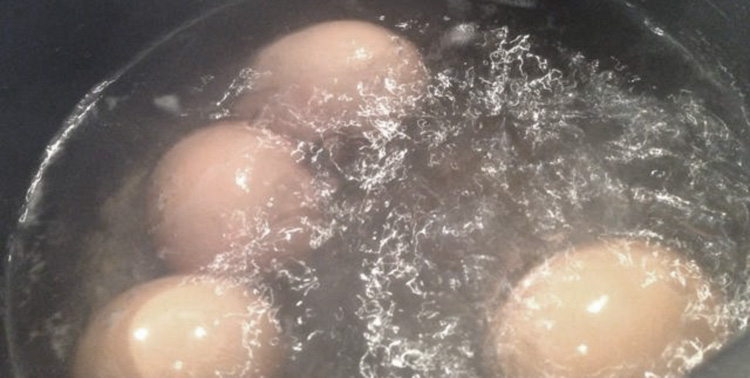
Camping in the lee of the wind was a good move for Graham and I, but it was still breath-snatchingly cold. At 8pm, as I did my best to move my shoulders and rub my aching arms, I recorded a temperature of -4 degrees celsius outside the tent. Yet, on the opposite bank in the face of the wind, it must have been much, much colder. Were Andy and Pete okay? I’d not seen or heard from them in ten hours.
I knew that I had to go and check on my friends. If Andy at Jade hadn’t woken me eighteen years earlier, I might not have woken at all. So it was my duty to go and check that my friends were okay.
I pulled on my wellies, hat and gloves, unzipped the tent (feeling the lip tingling and 'cheek pinching' bites of air on my face) and crawled out into the night. With a torch in one hand and a thermometer in the other, I walked towards where Pete and Andy were camping.
I passed Graham, who was boiling up a saucepan full of eggs in their shells.
“Hungry?” I enquired.
“Not really,” he replied, “just my traditional secret.”
“What d’you mean?” I asked?
“Best handwarmers invented,” said Graham, “Just pop a recently cooked hardboiled egg in your pocket and let it radiate its warmth. Then, when it's cooled, you can eat it. How many other forms of hand warmer can you eat?”
I left Graham to his survival cooking, wondering why I’d never thought of such an ingenious solution to cold and hunger. But soon my thoughts returned to Pete and Andy as I stepped out onto the exposed dam and felt the intensity of the wind.
Face the challenge
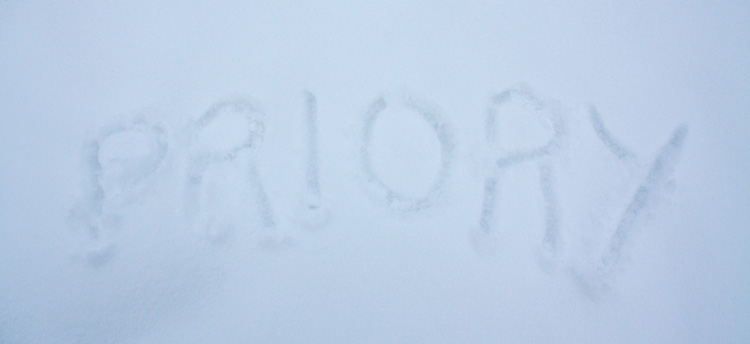
The gale was relentless and painfully cold. The thermometer read -7 degrees when I got to Pete’s swim. As expected, he was doing his best to stay awake rather than succumbing to the numbing delirium of cold-induced sleep.
As expected, I opened the conversation with the most obvious but inappropriate question: “Caught anything?” I asked, knowing that he’d reply with a comment about a cold and a red nose. But his slow movements and obvious discomfort prompted me to ask a second question: “Are you okay?”
“It’s not exactly ‘classic carp fishing’, is it?” replied Pete, “And the fishing’s slower than expected. Maybe it’s a little late in the season to be fishing with floating breadcrust?” Thankfully Pete still had his sense of humour. But, like me, he wasn’t geared up for this savage weather. His tent was being battered by the wind and one side of it was crusted in snow-like ice.
“You need to get out of the wind, Pete,” I said. “Give me thirty minutes, then fetch Andy and come over to my swim. I have an idea.”
I left Pete clutching his hands to his chest, then walked quickly back to my side of the lake. There was only one thought on my mind: start a fire.
Fire: it warms you three times
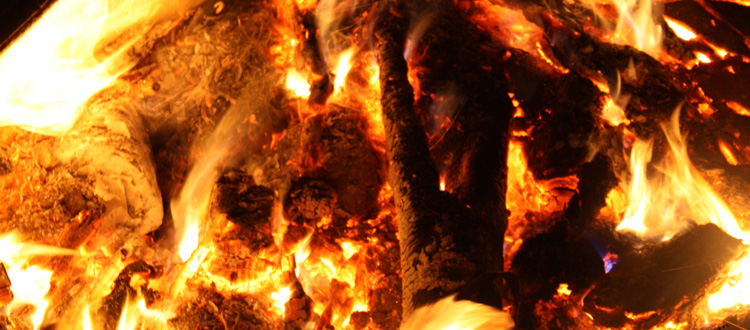
Fortunately I had everything I needed to make a fire: plenty of tinder and kindling put by for my Kelly Kettle, a folding saw in my rucksack, a fire steel and some cotton wool to get the fire started, and there was even an old rusty wheelbarrow by the lake that could be used to form a windbreak and heat reflector.
There was no shortage of timber for the fire. The storm had brought down loads of medium-sized branches that had yet to become damp from the soil, so I collected them up and dragged them to my pitch. I fetched my saw and began cutting them into two-feet long sections until I had a pile of branches large enough to feed a fire. I then tipped the wheelbarrow on its side, formed a small wigwam of tinder and twigs, then struck a flash of sparks from my fire steel into the tinder. It began to burn quickly, so I kept adding more and progressively larger sticks until the fire glowed with a strong heart. I then went and collected larger branches and logs and began sawing them up and placing them near to the fire for adding later.
By the time Pete, Andy and Graham arrived, I was sweating from the exertion and making bold promises of “You’ll have your toasted marshmallows yet!” I knew that the sight of the fire would lift our morale and warm our spirits before its heat would warm our bodies.
We huddled around the fire, almost touching shoulders so to avoid any heat escaping between us. Soon we were laughing and joking. The camaraderie returned and we began to forget the cold. But by midnight the fire was burning low and we were running short of timber. Feeling the cold begin to bite, Graham announced that he was going back to bed. As he stood up, he broke the ‘seal’ of bodies around the fire. We felt cold air gush in and suddenly the fire raged up – sending flames four feet high. We’d obviously been huddling so tightly around the fire that we'd starved it of oxygen.
Retreating from the sudden blaze, and checking we still had eyebrows, we advised Graham that he'd be wiser to stay close to the fire. But Graham had disappeared into the darkness, in search of his bed.
“You can’t blame him,” said I, “there’s only so long a broody hen can go before she snuggles back down onto her eggs.”
“Eh?” replied Pete and Andy.
“You wouldn’t believe me if I told you,” I replied, “Just call him Orpington, incubator of brilliant ideas. He won't be cold tonight, I assure you.”
That’s how four friends were able to survive a week in sub-zero temperatures. Though, of course, surviving on that sort of ‘warming diet’ can only be applied outdoors, and only when there's enough wind to mask your secret.
If you like this blog, you might like Fennel's books A Waterside Year and Traditional Angling. You might also like to subscribe to Fennel on Friday, where you'll be sent a blog, video or podcast to you via email each week.



